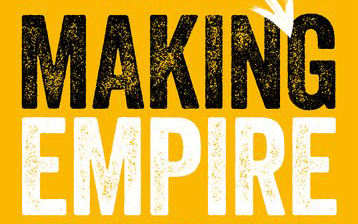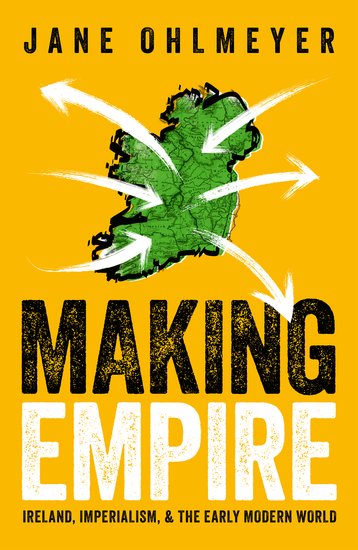
- Free Article: No
- Contents Category: History
- Review Article: Yes
- Article Title: Dark places
- Article Subtitle: The mess and murkiness of colonisation
- Online Only: No
- Custom Highlight Text:
Here is a joke that used to do the rounds during the Troubles in Northern Ireland. A plane was about to land in Belfast. During its descent, the pilot’s voice came over the announcement system: ‘Ladies and Gentlemen, we are now approaching Belfast International Airport. Welcome to Ulster. Please set your watches back four hundred years.’
- Featured Image (400px * 250px):

- Alt Tag (Featured Image): Ronan McDonald reviews ‘Making Empire: Ireland, imperialism, and the early modern world’ by Jane Ohlmeyer
- Book 1 Title: Making Empire
- Book 1 Subtitle: Ireland, imperialism, and the early modern world
- Book 1 Biblio: Oxford University Press, £30 hb, 358 pp
- Book 1 Cover Small (400 x 600):

- Book 1 Cover (800 x 1200):

In Ireland, history has often seemed indistinguishable from current affairs. But there are few corners of the world that do not feel, with livid immediacy, the history of modern imperialism. From debates about racial justice in the West to the current agonies in Gaza and Ukraine, there is no issue in contemporary politics and cultural debate more radioactive than this legacy. Yet, we do well to remember that even as the handle ‘imperialist’ is one of the slurs of our era, most human history for the past several millennia has been made up of empires – it is nation states that are the modern anomaly. Indeed, today’s imperial forces were yesterday’s colonial victims. ‘And this also,’ said Joseph Conrad’s Marlow in Heart of Darkness (1899), reflecting on the Roman conquest of Britain, ‘has been one of the dark places of the earth.’ Empires may typically be exploitative and violent, based on dispossession, conquest, and usually slavery, but they are ubiquitous, complex, internationalising, hugely impactful on the peoples that experience them, and, ultimately, liable to collapse.
Friedrich Engels famously described Ireland in a letter to Marx as ‘England’s first colony’. Jane Ohlmeyer’s new book brings home the resonance of that observation by treating the birth of modern global British imperialism in late sixteenth- and seventeenth-century Ireland. Note that the notional pilot above says four hundred years: not eight hundred, the usual period ascribed to English domination following the Anglo-Norman invasion, after which the ‘Old English’(as they were known) became assimilated into Gaelic culture. Ohlmeyer argues that it is the early modern plantation of Ireland by England that provides the laboratory, or the model, for the British imperial conquests in Africa, India, and the Americas. It is in this period that the ideological justifications for Empire are developed – the assumption that a superior culture or people should actively supplant an ‘inferior’ one – and that the legal, administrative, and military frameworks by which this domination and planting might occur are tested and refined.
Irish historians used to get quite exercised about whether Ireland could really be called a colony. Would it not be better described, after Henry VIII’s 1541 Crown of Ireland Act, as its own kingdom? Following the Union in 1801, it even had extensive direct representation in the Westminster parliament. What ‘colony’ looks like that? In part, this debate was distorted by the Troubles (1968–98), in which the credo that Ireland had been colonised by England and that six counties were still ‘occupied’ underpinned the violent campaign of the Provisional IRA. For Ohlmeyer, that Ireland merits the handle is beyond doubt. The methods used for its subjugation were explicitly those of dispossession, cultural extirpation, and supremacy. Perhaps the most notorious statement of this ideology is from Edmund Spenser, poet and sometime colonial administrator, who in 1596 diverted from writing The Faerie Queen to pen his A View of the Present State of Ireland, with its rabid calls for the eradication of Irish legal custom (Brehon Law), religion, and language. The othering of the Irish as barbaric and inferior would endure into nineteenth-century discourses around race and degeneracy. Yet in the seventeenth century, as now, the justification for imperial domination and control was often cloaked in the language of ‘improvement’ and ‘civility’, dispossession and violent usurpation justified by ‘progress’.
Yet while Ireland was a colony, Irish people, as Ohlmeyer demonstrates, were centrally involved in the processes of colonisation, at home and elsewhere. If the methods were first tested on the Irish, the Irish – both Catholic and Protestant, native and settler – would go on to administer the institutions of empire all round the world. Irish colonial police, soldiers, administrators, priests, merchants, and farmers were central to the British imperial project, as one would expect, but were also to be found in the Spanish, French, and Portuguese empires. The so-called ‘Wild Geese’ fled to Catholic France and Spain from the 1500s to 1700, often becoming mercenary soldiers in these armies. (Incidentally, The Wild Geese, a hospitality venue about to open in Melbourne, will be the new home of Melbourne’s venerable Celtic Club, itself a manifestation of the Irish role in the colonial settlement of Australia.)
So, if Ireland stands as an exemplar or a laboratory, it is also anomalous, a victim of conquest but also complicit with European domination and global reach. Irish Catholics travelled to the remotest corners of the world as educators and missionaries. Ohlmeyer’s high-level thematic study embraces this complexity and ambivalence with even-handed and non-judgemental witness. Her tale is one of assimilation, interaction, and hybridity, as well as extirpation and Anglicisation. Ireland never did become England, even if Gaelic civilisation was brought low. There is a section on intermarriage, which was frequent, despite the efforts of some in authority (including Spenser) to stamp it out. A touchstone for her study is Brian Friel’s play Making History which premièred in the Guild Hall in Derry (itself a centre of colonial administration) at the height of the Troubles, in 1988. It treats Hugh O’Neill, the Irish nationalist hero who led the war against Elizabeth I, and his marriage to Mabel Bagenal, the daughter of the local Protestant planter. The play helps Ohlmeyer cast light on the vagaries and ambivalence of identity, power, and pragmatism. Hugh, despite his Gaelic lordship and stature as a nationalist icon, was enmeshed in the networks of English high society and married Mabel in order to ‘bring civility into my house’.
Complicity with native élites would become a hallmark of later imperialism, by which the conquered subjects would interiorise a sense of their own inferiority and often continue the logic of oppression. But doubleness and inversion of various sorts recur, misery handed on from victim to victim. Irish indentured servants who, after the Cromwellian conquest, were sent in wretched conditions to Montserrat – a country which still flamboyantly bears witness to its Irish past – would go on to become slave owners once they regained their own freedom. Some of these Montserrat Irish would also go on to participate in the colonisation of Australia.
This book, divided into six thematic chapters, originated as the James Ford Lectures in British History at the University of Oxford in 2021. Ohlmeyer had to deliver them remotely from Dublin because of the pandemic. They bear some of the qualities of the public lecture mode – wide ranging, accessible, magnanimous. Ohlmeyer is generous and non-judgemental, and, like all good historians, tries to look at historical events through the eyes of the participants, those who did not know what was going to happen. This means her book brings out the contingency, mess, and murkiness of colonisation and the resistance it generated; the stumbling designs of the imperial power and the forgotten pushbacks against it. There is a capacious focus here, ranging across history and geography, and also a disciplinary eclecticism. It variously cites contemporary poets and playwrights, the evidence of material history and archaeology, and the visual arts. There are some subtle readings of portraits and paintings, often focusing on mixed English and Irish cues, that reinforce a point about hybridity or cultural mix. It is a book about Ireland which is simultaneously about world imperialism and the early modern period – with haunting echoes in the present.


Comments powered by CComment